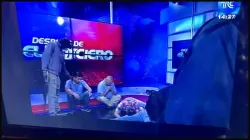Ecuador: Prosecutor investigating dramatic TV studio attack shot dead amid rising violence
Prosecutor César Suárez, who had carried out other high-profile investigations in the past, was shot while driving a vehicle, according to Attorney General Diana Salazar. At least 13 people have been arrested in the assault at TC Television after President Daniel Noboa declared an emergency.

An Ecuadorian prosecutor investigating a dramatic attack at a television station earlier this month was shot dead on Wednesday in Guayaquil, Ecuador's largest and one of the most dangerous cities, while the country grapples with escalating violence. He was probing the incident where masked men carrying guns and explosives interrupted a live broadcast by TC Television after President Daniel Noboa issued a 60-day state of emergency.
The armed men were dressed mostly in black and were wearing balaclavas as they accosted staffers before the feed ended. The attackers entered through the reception of Gamavision, with whom TC shares the site, assaulted the staff there, and left dynamite behind, TC news coordinator and reporter Leonardo Flores Moreno told Reuters. No one was killed in the incident.
Prosecutor César Suárez, who had carried out other high-profile investigations in the past, was shot while driving a vehicle, Attorney General Diana Salazar said. “Organized crime groups, criminals, terrorists will not stop our commitment to society,” she said in a video broadcast on X.
At least 13 people have been arrested in the assault at TC Television, which was broadcast live and led President Daniel Noboa to declare that Ecuador is in an “internal armed conflict” amid a surge of killings and other crimes tied to drug trafficking.
Images of gunmen taking over a TV studio at public broadcaster TC on Tuesday afternoon were carried live for about 20 minutes and made headlines around the world. Alina Manrique, a 39-year-old journalist who was among those held hostage, said she had feared she was going to be killed and imagined never seeing her children again. Being rescued by police after the gunmen surrendered was like "being reborn," she said.
Violence in Ecuador
Ecuador has been rocked by several instances of violent attacks, with the kidnappings of at least seven police officers and a series of explosions across the country, a day after Noboa declared a state of emergency. The decision was made in response to the prison escape of one of the most powerful drug gang leaders on Sunday.
The state of emergency was declared after Adolfo Macias, known as "Fito", the leader of the Los Choneros criminal gang, was discovered missing from his cell in a low-security prison on Sunday. He was scheduled to be transferred to a maximum security facility that day. Authorities said a group of prisoners escaped from a penitentiary in Riobamba, including Fabricio Colon Pico of the Los Lobos group, who was allegedly involved in an attack plot against the attorney general. At least 17 of the 39 escapees have been recaptured, the prosecutor's office said.
Shortly after the TV station incident, military and police operations took place around Ecuador as the country grappled with a wave of violence and the detention of nearly 180 prison staff by inmates. Noboa declared a 60-day state of emergency, sending the military onto the streets and naming 22 gangs as terrorist groups, and said on Wednesday that US aid was expected within days.
Noboa has said he will not negotiate with "terrorists" and the government has blamed the recent prison violence on Noboa's plan to build a new high-security prison and transfer jailed gang leaders. However, some Ecuadorians demanded action beyond the 60-day state of emergency. "The previous government declared them and they were ineffective. Noboa needs to take more drastic measures, go out with the police and armed forces to impose order... He must take the bull by the horns," said Marcelo Gordillo.
Security in Ecuador has been worsening since the coronavirus pandemic, which also brutally battered the economy. Ecuador's presidential contest last year was marred by the assassination of an anti-corruption candidate. The government blames the situation on the growing reach of cocaine-trafficking gangs, who have destabilised much of the South American continent.
(with inputs from AP)
ALSO READ | Ecuador: Masked gunmen interrupt live TV broadcast as violence rages across country | WATCH